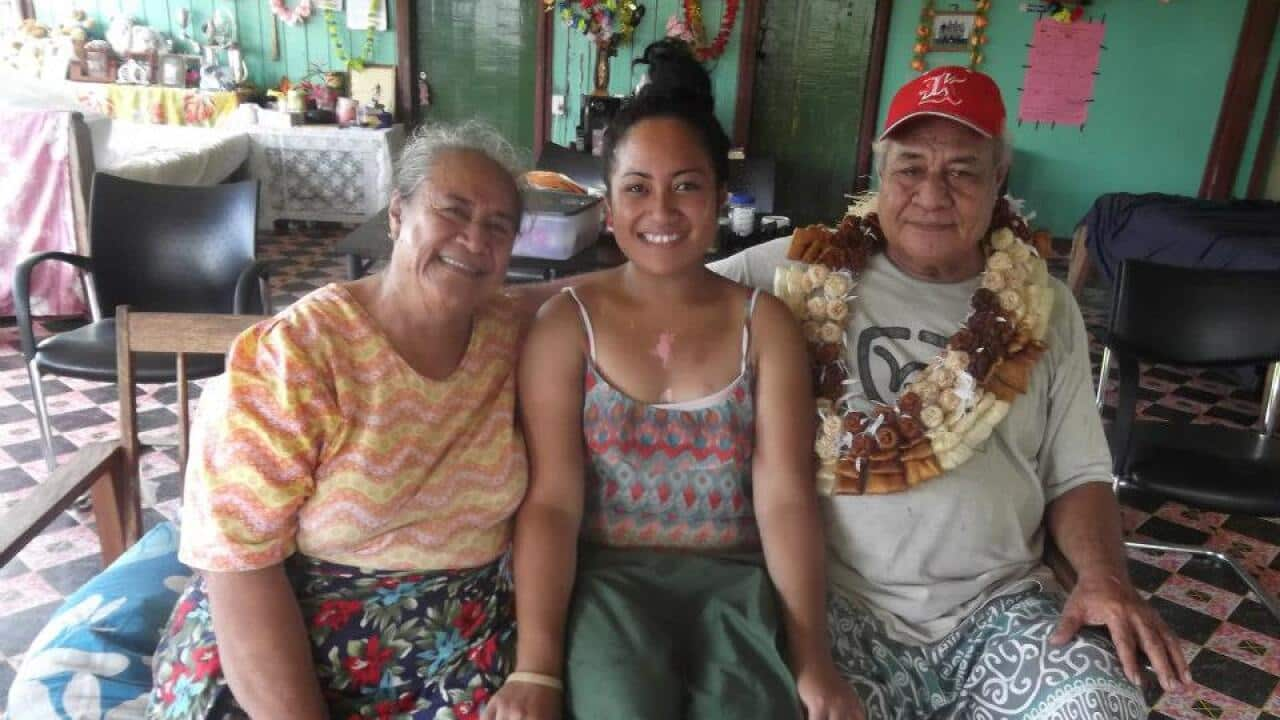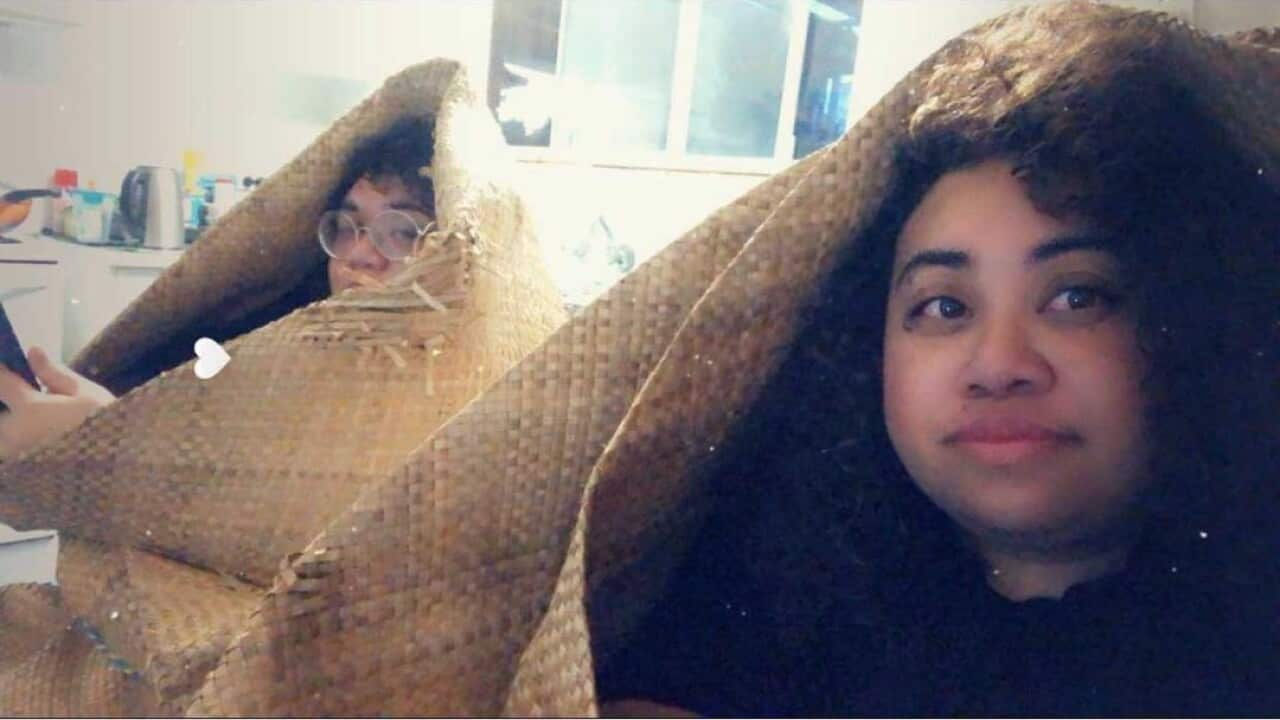Content warning: Mentions of assault.
I lifted my frizzy curls off the back of my neck. Golden hour stained the sky like turmeric in hot oil but my eyes were on my jandals and the angry blisters on my big toe. My thunder thighs burned. I walked a few steps out onto The Boulevarde, the road that connected Lakemba to Punchbowl. I squinted to see if the traffic lights all the way at the top of the hill were red so I could save a few seconds by cutting across. When the road was clear, I stepped forward. Someone’s brakes screeched behind me and I looked back. In a second, I was dragged into a car and assaulted.
The sun was still setting when I ran home, crying and holding my torn shirt to my chest. My thighs were still burning, the breeze was still cool for November, ibises were still scooping up garbage near the train tracks. The world continued as though nothing had happened, as though the vā between myself and all else was still intact. For us Samoans, the vā is a concept that unites all others in our culture and way of life – it is ‘a space between’. As snot-nosed children we were told to stoop and say ‘tūlou’ when passing through. ‘Fai le ‘upu’ was to us the equivalent of ‘What’s the magic word?’ – in that, by saying it, you were acknowledging another’s being and their space. The vā, for me, was destroyed that day. Every sound of every car passing crashed on me in waves that tore out the breath from my chest. Tears covered my face like hot mud but I couldn’t blink in case he was behind me again. Tracking me, hunting me down. My toes scraped the pavement as I ran. My blisters burst and bled. I was Sina, pursued by the Eel.
‘Fai le ‘upu’ was to us the equivalent of ‘What’s the magic word?’ – in that, by saying it, you were acknowledging another’s being and their space.
O le Tala ia Sina ma lana Tuna – The Tale of Sina and the Eel
In the ancient days of Samoa, Sina was a tama’ita’i whose beauty was known across the Oceans. She was swimming at the vai in Safune when she caught sight of an eel following her. In some recounts, he became a beloved pet. In others, he was a predator. The eel fell deeply in love and asked for Sina’s hand in marriage. She rejected him and fled. When she returned to the vai another day, the eel approached her again.
‘E pupula mai, ou mata o le alelo!' she yelled. ‘You stare at me with the eyes of a demon!’
Sina ran to the village. The eel pursued her even there. Sina ran on, towards the fale of the matai and when the villagers seized the eel, he begged for one last chance to prove his love and asked that his head be chopped off and buried in the village. Thus, the first coconut tree was planted. His dying wish meant he could provide for Sina as a symbol of his love. In other stories, his beheading was a symbol of his penance. The coconut provided shelter with the leaves being used for the roof and walls of a fale, the husk used for fire, the coconut for the consumption of its flesh and water. The eel’s two eyes and mouth are visible on the husked coconut so that as you drink one, even to this day, the eel imparts his final kiss.
Nine years have now passed since my assault and the vā between myself and the world is healing. The trauma clings to me but therapy, though difficult for a woman of colour from Western Sydney like me, . I also found solace in , or traditional storytelling. In the tale of Sina and the Eel, I am reminded of the matai, the villagers. Her aiga. I am reminded of Sina’s perseverance as she fled, of the way her thighs must have burned and her hair must have stuck to the back of her neck. I even visited the vai at which Sina spotted the Eel. Today, the vai at Safune is called Mata-o-le-alelo, named after Sina’s exclamation upon seeing the Eel. I’ve discovered modern retellings like Avia’s where the Eel and Sina meet in the ‘cyber ocean’ of an online chatroom. In Samoan stories of the past and present, I am reminded of the good in life, of a woman’s right to say no and those who seek to protect that right. As a Samoan-Australian woman living away from aiga in South-West Sydney, thinking about my people, my culture and my heritage has now, more than ever, become a daily event. My people are being seen and heard: from seeing NZ prime minister Jacinda Ardern performing an
As a Samoan-Australian woman living away from aiga in South-West Sydney, thinking about my people, my culture and my heritage has now, more than ever, become a daily event. My people are being seen and heard: from seeing NZ prime minister Jacinda Ardern performing an

Credit: @thewheelchairphotographer Source: Supplied
ifoga for New Zealand government’s atrocities to Pacific Islanders in Aotearoa during the Dawn Raids
, to as their first ever female prime minister, to Facebook stories of my cousin Tui in Bundaberg, fighting through separation from his aiga and a gruelling work schedule as part of the .My culture is bleeding into my waking reality and I’ve begun to turn to it for healing in ways I hadn’t before. Clarissa Pinkola Estes, author of Women Who Run With Wolves : ‘Being able to say that one is a survivor is an accomplishment. For many, the power is in the name itself. And yet, comes a time in the individuation process when the threat or trauma is significantly past. Then is the time to go to the next stage after survivorship, to healing and thriving’. The stories of my ancestors are what binds me to my will to keep surviving. Through my people I am healing and thriving.
If you or someone you know is impacted by sexual assault, call 1800RESPECT on 1800 737 732 or visit 1800RESPECT.org.au.
Christine Afoa is a Samoan-Australian writer born and raised in the Bankstown area. She is undertaking a creative writing degree at the University of Technology. Christine has performed poetry for SoFar Sounds Lounge and Bankstown Poetry Slam and her short stories have been published in UTS Writers’ Anthology 2018: Light Borrowers, 2019: Infinite Threads and Sweatshop Women: Volume One. Christine is a member of Sweatshop: Western Sydney Literacy Movement.
This article is part of SBS Voices' Straight Up Islander series, showcasing the work of writers with ancestral ties across Oceania. It has been edited by Winnie Dunn, in partnership with Sweatshop Literacy Movement Inc.

A commissioned illustration for the SBS Voices 'Straight Up Islander' collection by artist Tori-Jay Mordey. Source: Tori-Jay Mordey
Straight Up Islander

Introducing 'Straight Up Islander', a celebration of writers of Oceania





